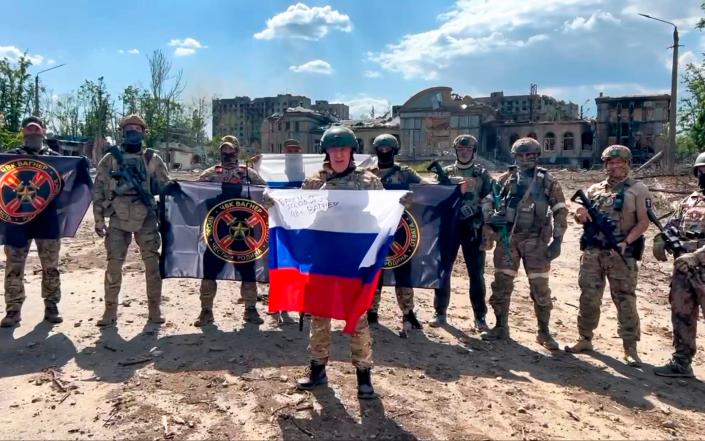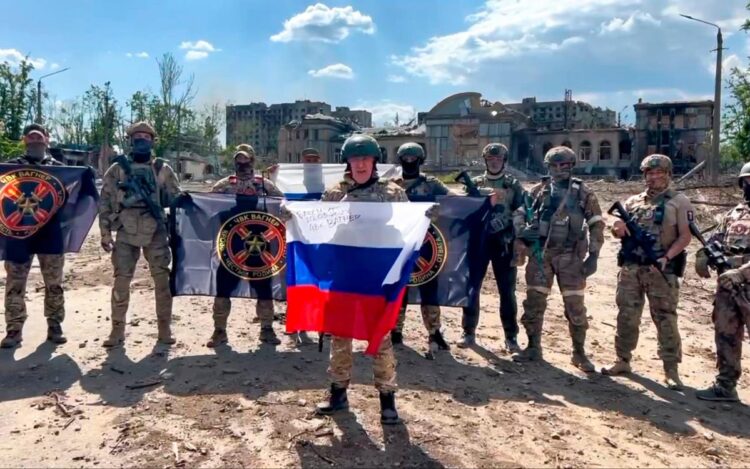
Yevgeny Prigozhin’s latest bombast against the Russian MOD and, by inference, the Kremlin itself, should not be seen as just another rant from a blowhard with a track record. His extraordinary threats of internal violence – “mobs with pitchforks” – and even revolution are a stark indicator of just how serious things are getting behind the scenes for Putin’s regime.
Prigozhin was predictably swift to claim credit for his Wagner forces in the capture of Bakhmut, but seemed to place greater emphasis on the cost. He claimed 20,000 of his own men had been killed, which is almost certainly a gross under-estimate, and to that we must add a very large number of Russian army troops. Given that possession of Bakhmut brings Russia no obvious strategic or even tactical gain, Prigozhin’s apocalyptic talk almost echoes the sentiments of King Pyrrhus of Epirus after he defeated the Romans at the Battle of Asculum, that “one other such victory would utterly undo him”.
Bakhmut stands as an allegory of the entire Russian war so far – inflicting huge damage at great cost and to no advantage. If it continues in this vein, Prigozhin’s vision of revolution is not impossible. He spoke of 1917, when soldiers and their families stood up against the Russian government. But you don’t need to go back that far to draw even closer parallels to what is happening today. The war in Afghanistan played a major role in the break-up of the Soviet Union in 1991.
Originally conceived as a short-term intervention, like Ukraine, the campaign in fact went on for 10 years and cost more than 15,000 Soviet lives. Defeat at the hands of US-armed mujahideen fighters humiliated and discredited the Soviet army, vitiating the glue that was so essential in holding the country together. Loss of perception of military invincibility emboldened dissidents including disaffected war veterans and their families, especially in the non-Russian republics which provided a disproportionate quantity of the fighting troops – and the casualties.
Afghanistan also undermined the confidence of Soviet leaders to rely on the army to quell rebellion. Anti-war feeling grew among the population as the conflict ground on and casualties built up, causing a fundamental shift in the hitherto compliant media, which began to publish non-approved news stories about what was going on in the war and at home.
All of these effects are more acute today, with vastly greater casualties in a much shorter time, inflicted on a significantly smaller population. And in an era where the internet and social media throws military ineptitude under a much more intense spotlight than was ever imaginable back in the days of Afghanistan.
The impact of a catastrophically failing war could perhaps be weathered better in a country with greater structural resilience. But the Russian Federation is hyper-fragile, with its energy dependent economy ruptured by sanctions, rampant corruption increasingly resented by a population with limited prospects of prosperity further diminished by war, growing ethnic resentments among non-Russian populations who have paid the highest price in the fighting, and a political system totally dependent on Putin’s cult of personality that has now been harshly exposed as damaged goods.
If this war does lead to fundamental change in the Russian Federation it is likely to follow a much rockier road than the break-up of the Soviet Union. One thing we should not expect to see is an emergent regime that wants to end the war, usher in a new democracy and establish cordial relations with the West.
Don’t expect another Mikhail Gorbachev. Instead, we could well be looking at a protracted scenario of chaos, violence, rebellion and repression, with fighting between the Russian army, national guard, security services, the plethora of private armies and perhaps Prighozin’s vision of mobs on the streets with pitchforks. Even if it doesn’t collapse into ethnic fiefdoms, it will be fought over by competing hardliners incensed by the betrayal of their forces by a corrupt elite.
None of this might happen of course, but we should remember that the disintegration of the Soviet Union was unexpected both in scale and speed; it was too big to fail. If, however, something like it does come to pass, the fall of the Russian Federation might diminish the present threat it presents to European and global security.
But this time, let’s not hear any talk of “peace dividends”, because we can be certain of one thing – Russia will rebuild itself and once again come out fighting.
Colonel Richard Kemp is a former British Army officer. He was an infantry battalion commander and saw active duty in Bosnia, Iraq and Afghanistan
[ad_2]
Source link







